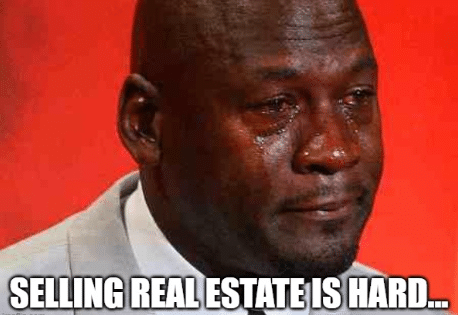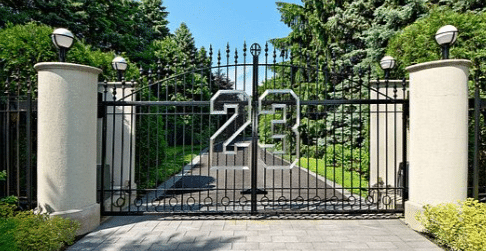10 Things Commercial Real Estate Sellers Can Learn from Michael Jordan
Michael Jordan’s name is synonymous with greatness, but his Highland Park mansion tells a different story. On the market since 2012, this 56,000-square-foot estate originally listed for $29 million, only to be reduced to $15 million—and yet, it remains unsold. What can commercial real estate professionals learn from this seemingly unsellable property? Jordan’s mansion offers a wealth of insights into how to effectively list and sell unique properties, whether they’re luxury estates or commercial spaces.

Let’s explore 10 important lessons from the challenges of selling Michael Jordan’s Highland Park estate.
1. Over-Personalization Limits Appeal
Jordan’s Highland Park mansion is an extraordinary example of personal taste and branding. The number “23” on the gate, the basketball court bearing Jordan’s name, and a poker room with a built-in cigar humidor all scream “Michael Jordan.” While these unique features are a dream for fans, they create an extremely narrow appeal for buyers.
Personalization can be both a selling point and a hindrance in commercial real estate. Properties tailored to specific businesses or industries may alienate other potential buyers or tenants. For instance, an office building fully customized for a law firm may be difficult to lease to tech startups or creative agencies without expensive renovations. The key is to create a flexible, adaptable space that appeals to a broader market. Customizations that are too specific, such as branded office interiors or built-in equipment, can deter buyers who are looking for a blank slate to make their own.
2. Location is Everything
Jordan’s mansion is inland in Highland Park, away from Lake Michigan, which many buyers in the luxury market prefer. Most people who spend that kind of money on Chicago’s North Shore want to live on the lake.
As a consequence, commercial properties, location is a critical factor in determining both the value and the appeal of a listing. Offices near public transit hubs, retail spaces in high-traffic areas, and industrial buildings close to transportation routes are in higher demand. Even if a property has world-class amenities, it will struggle to attract attention if it’s in a location that doesn’t align with what buyers are seeking. When a property is in a less-than-ideal location, it becomes even more important to emphasize its unique features and adjust the price to reflect its surroundings.
3. Know Your Target Market
Jordan’s Highland Park home is designed for someone who has a deep appreciation for basketball and has the funds to maintain such a massive property. The highly personalized nature of the mansion, with features like a full-size basketball court and a custom poker room, limits the potential buyer pool to a select few who share Jordan’s passions.
In commercial real estate, it’s crucial to understand your target market and tailor your marketing strategy accordingly. For example, a high-tech facility with specialized equipment may only appeal to certain industries, while an open-concept office space may attract startups or creative companies. Understanding the needs and preferences of your ideal buyer or tenant allows you to focus your marketing efforts where they’re most likely to be effective. Broad marketing strategies might attract attention, but targeted approaches ensure you’re reaching the right people.
4. Brand Power Has Limits
Despite Michael Jordan’s legendary status, his name hasn’t been enough to sell his Highland Park mansion. In fact, the strong association with his personal brand might be working against him. Potential buyers may feel that living in Jordan’s house comes with a set of expectations or pressures they don’t want to deal with.
Similarly, in commercial real estate, a well-known brand associated with a property can be both an asset and a liability. While the previous tenant or owner’s success may lend prestige to a building, new buyers or tenants will want to create their own identity. Instead of relying on the previous occupant’s brand to sell a property, focus on the property’s features and how it can serve the next owner’s needs. Brand power is only one piece of the puzzle when selling or leasing a commercial space.

5. Set a Realistic Price from the Start
Jordan’s mansion has seen significant price reductions over the years, starting at $29 million and now listed for $15 million. Even after these cuts, the property remains unsold, likely because its price hasn’t aligned with the market’s perception of its value.
Setting the right price from the outset is crucial in commercial real estate. Overpricing a property can lead to prolonged periods on the market, which may cause potential buyers to lose interest or question the property’s true value. Accurate pricing based on a thorough market analysis is key to attracting serious buyers early in the process. While luxury and unique features can justify a premium price, they also need to align with current market conditions and buyer expectations. Properties that linger on the market too long can develop a stigma, making them even harder to sell later.
6. Innovative Marketing Strategies Need Substance
Jordan’s team tried several innovative marketing strategies, including viral videos and a campaign that offered a full collection of Air Jordan sneakers to the buyer. While these efforts generated buzz, they didn’t result in a sale.
In commercial real estate, marketing innovation is important, but substance is key. Flashy videos and eye-catching campaigns can attract attention, but they need to be backed by the property’s actual value and appeal. Virtual tours, drone footage, and digital ads are effective tools, but they should highlight the property’s strengths and help potential buyers or tenants visualize how the space can meet their needs. Relying too heavily on gimmicks without addressing the practical concerns of buyers won’t lead to long-term success.
7. Carrying Costs Add Up Over Time
Jordan has spent more than $1 million in taxes since listing his Highland Park mansion, along with additional costs for security, upkeep, and maintenance. The longer a property sits on the market, the more it costs the owner to maintain it.
For commercial properties, carrying costs can be substantial, including property taxes, utilities, insurance, and maintenance. These costs can quickly add up if a property isn’t generating income through a sale or lease. It’s important to balance patience with financial realities. While waiting for the right buyer may seem wise, owners need to consider how long they can afford to hold onto a property before it becomes a financial burden. Sometimes, adjusting the price or considering alternative uses for the property can help reduce carrying costs.
8. Specialized Properties Require Tailored Marketing
Jordan’s Highland Park mansion is highly specialized, with features like a full-size basketball court, cigar room, and doors from the original Playboy Mansion. These elements require a very specific type of buyer, which makes traditional marketing methods less effective.
In commercial real estate, properties with unique or specialized features need equally unique marketing strategies. For example, a former manufacturing facility might appeal to industrial companies, while a high-tech research lab could attract biotech or pharmaceutical firms. Tailoring your marketing approach to the specific industries or businesses that would benefit most from the property’s features can help you reach the right audience. A one-size-fits-all approach rarely works for specialized properties.
9. Be Aware of Zoning and Regulatory Restrictions
Jordan’s mansion has been considered for various uses, from a museum to a conference center, but zoning issues and limited parking have prevented these ideas from moving forward.
In commercial real estate, zoning laws and regulatory restrictions play a critical role in determining how a property can be used. Before marketing a property for alternative uses, it’s essential to understand the local zoning regulations and any other legal hurdles that could affect the sale or lease. If a property is being marketed for repurposing, ensure potential buyers are aware of any upfront restrictions. This transparency can help avoid wasted time and effort on both sides.
10. Patience is Key, but Don’t Let a Listing Go Stale
Jordan has shown impressive patience in waiting for the right buyer for his Highland Park estate, but there’s a fine line between patience and letting a listing go stale. Properties that stay on the market for too long can develop a negative perception, making buyers wonder if there’s something wrong with them.
In commercial real estate, staying proactive with long-term listings is important. Regularly updating the property’s marketing materials, re-evaluating the price, and refreshing the listing can keep interest alive. While waiting for the right buyer is important, staying engaged with the market and making necessary adjustments can prevent a property from becoming stale in the eyes of potential buyers.
Conclusion: Learning from the Lessons of Highland Park
Michael Jordan’s Highland Park mansion offers a fascinating case study in the challenges of selling a unique and highly personalized property. Over-personalization, unrealistic pricing, and specialized features have all contributed to its prolonged time on the market. In commercial real estate, the same principles apply: properties must be positioned to appeal to a broad market, priced appropriately, and marketed effectively. By avoiding these pitfalls, real estate professionals can ensure that their listings attract the right buyers and close deals faster. Learning from Jordan’s experience can help brokers, agents, and property owners successfully navigate the challenges of selling commercial real estate, whether it’s an office building, retail space, or industrial complex.


